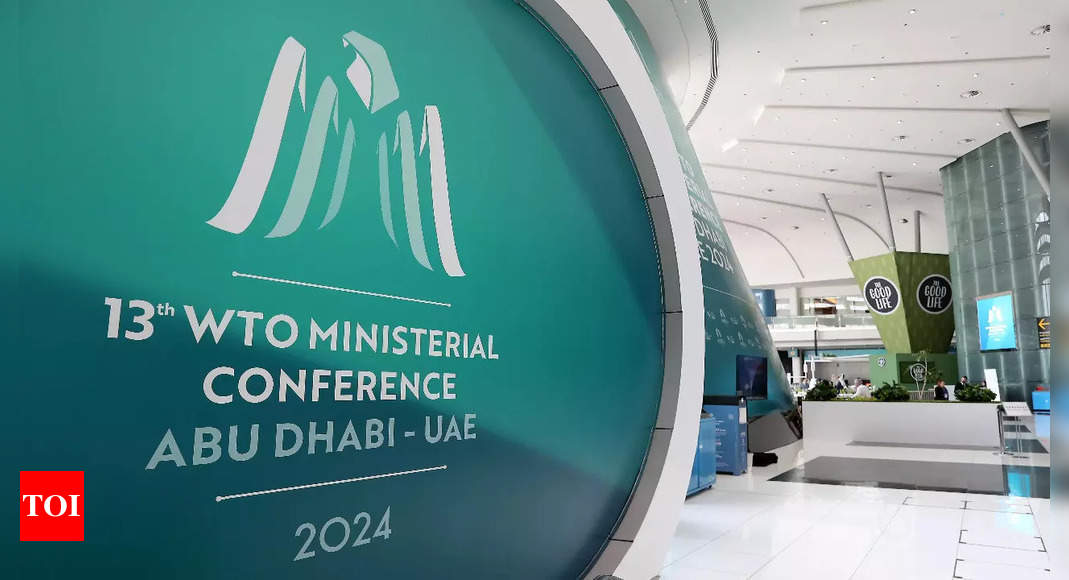
ABU DHABI: Trade talks went into extra time as ministers sought to salvage a last-minute deal, with the focus largely on getting an outcome on India’s longstanding demand for a solution on public stockholding, and no further extension of the moratorium on e-commerce for electronically sharing movies and books.
Of 30-odd paragraphs in the outcome document, eight to 10 had been agreed upon till late evening.Ministers and officials are expected to spend the night finalising the text with the meeting now slated to close around Friday noon instead of 8pm local time Wednesday. “The issue has boiled down to agriculture and e-commerce,” a negotiator told TOI.
Divisions on remittances, movement of health workers
There are deep divisions on several issues, including areas of interest to India such as remittances and movement of health workers. India has managed to keep investment facilitation agreement, a China-backed initiative with over 120 countries, out of the scope of WTO agreements for the moment, a negotiator told TOI.
An outcome on fishing is looking difficult, given the deep wedge. Like India, some of the Pacific countries are demanding a reduction in subsidies by rich nations, which offer up to $75,000 annually to every fisherman, and are arguing that they will only cap their subsidies if there is a commitment from the advanced nations to reduce their support. In addition, India is seeking that the rights for its artisanal fisherfolk to venture into exclusive economic zone that extends up to 200 nautical miles must be retained.
EU’s keenness on getting an extension of the e-commerce moratorium has, however, opened some possibility of a give-and-take, despite countries such as Brazil joining the ranks against continuing with the waiver beyond March.
Till evening, there appeared little sign of progress on agriculture, especially on finding a solution to public stockholding – that allows countries such as India to maintain a large stock of grains to feed its large population. On Thursday, Brazil took an aggressive position, demanding a reduction in domestic support, a defensive issue for EU, and threatened to block an extension of the moratorium. India has maintained that talks on domestic support or tariffs should not take place until the issue of food stocks was addressed. Negotiators indicated that a work programme on reducing tariffs and cutting subsidies is expected amid discussion on revising the reference price from 1986-88 for calculating food subsidie.
Of 30-odd paragraphs in the outcome document, eight to 10 had been agreed upon till late evening.Ministers and officials are expected to spend the night finalising the text with the meeting now slated to close around Friday noon instead of 8pm local time Wednesday. “The issue has boiled down to agriculture and e-commerce,” a negotiator told TOI.
Divisions on remittances, movement of health workers
There are deep divisions on several issues, including areas of interest to India such as remittances and movement of health workers. India has managed to keep investment facilitation agreement, a China-backed initiative with over 120 countries, out of the scope of WTO agreements for the moment, a negotiator told TOI.
An outcome on fishing is looking difficult, given the deep wedge. Like India, some of the Pacific countries are demanding a reduction in subsidies by rich nations, which offer up to $75,000 annually to every fisherman, and are arguing that they will only cap their subsidies if there is a commitment from the advanced nations to reduce their support. In addition, India is seeking that the rights for its artisanal fisherfolk to venture into exclusive economic zone that extends up to 200 nautical miles must be retained.
EU’s keenness on getting an extension of the e-commerce moratorium has, however, opened some possibility of a give-and-take, despite countries such as Brazil joining the ranks against continuing with the waiver beyond March.
Till evening, there appeared little sign of progress on agriculture, especially on finding a solution to public stockholding – that allows countries such as India to maintain a large stock of grains to feed its large population. On Thursday, Brazil took an aggressive position, demanding a reduction in domestic support, a defensive issue for EU, and threatened to block an extension of the moratorium. India has maintained that talks on domestic support or tariffs should not take place until the issue of food stocks was addressed. Negotiators indicated that a work programme on reducing tariffs and cutting subsidies is expected amid discussion on revising the reference price from 1986-88 for calculating food subsidie.
Source link

